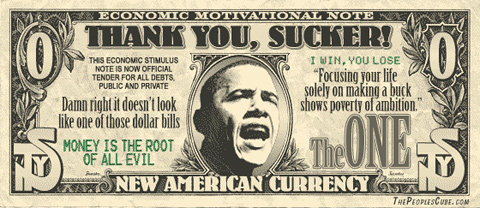
Alan Caruba
Spending more has never worked!
By Alan Caruba
Ask any financial advisor what to do when you are drowning in debt and they will tell you to spend less and pay down your debt. This is just common sense. However, if you ask politicians what to do, they will advise that the nation spend more and borrow more.

Despite a huge national debt and deficit, the federal government just concluded its biggest spending year with its second biggest annual budget deficit. For fiscal 2011 which ended September 30, the government spent $3.6 trillion, an increase over the $3.52 trillion posted in 2009.
The budget "deficit" is the difference between the revenues that government took in and what it spent. The "debt" is the accumulation of yearly deficits. The U.S. has a debt of $15 trillion and this grows by billions daily due to the interest that must be paid on the amount of borrowing required to sustain its operations. Fully 40 cents of every dollar the government spends is now borrowed.
The Congressional Budget Office noted that the deficit is "greater than in any year since 1945" as World War Two wound down. As a Wall Street Journal editorial expressed it, "The Obama years have racked up the three largest deficits, both in absolute amounts and as a share of GDP, since Hitler still terrorized Europe."
In the wake of the failed Super Committee, charged with cutting a mere $1.2 trillion over ten years, the editorial noted that "President Obama fiercely resisted even the token spending cuts for fiscal 2011 pressed by House Republicans earlier this year." He continues to press for higher taxes on "the rich" despite the fact that the rich pay the lion's share of income taxes already. By Obama's definition, the rich is anyone earning more than $200,000 a year. By most definitions, that qualifies as middle class, not rich.
We are entering a period that is likely to be called something like the Great Depression Two or 2.0. History usually serves as a guide and, as Hans Bader, counsel of special projects for the Competitive Enterprise Institute has noted, "government spending (and budget deficits) rose dramatically in the Depression under both the Hoover and the Roosevelt administration...(both) increased, rather than cut, spending in the Great Depression."
It is a dangerous thing to cling to myths about the Great Depression. Bader says "Big government liberalism is a religion, not a school of rational thought. A false understanding of the history of the Great Depression is the cornerstone of left-wing ideology..."
The Great Depression was a series of recessions. In the August 5 New York Times, Bader noted that "In 1937, the Supreme Court upheld anti-business legislation that had been struck down by lower courts, like the National Labor Relations Act, in decisions like National Labor Relations Board v. Jones & Laughlin Steel Corporation. That made unions more powerful, led to a wave of costly strikes and discouraged hiring. The increased wages demanded by unions resulted in employers laying off many workers."
Does this sound familiar? Efforts by States to rid themselves of collective bargaining, primarily with civil service unions such as Service Employees International Union (SEIU), is a reflection of the way they have drained public coffers with wage, pension and health plans that exceed those of private enterprise. Andy Stern, the former SEIU president, just had a commentary published in The Wall Street Journal in which he urged the U.S. to adopt Chinese Communism!
In Wisconsin, Ohio, and elsewhere, unions representing government workers and others in the private sector have spent millions to defeat such efforts to end collective bargaining. New Jersey Governor Chris Christie gained national attention for his efforts to curb that state's teacher's union demands.
What President Obama calls a "do nothing Congress" is one in which his party controlled both houses of Congress until the 2010 elections. It will live in infamy for imposing Obamacare on a nation that has flatly rejected it.
The Supreme Court will hear the suit brought against it by 26 state attorney generals. If permitted to stand, it will destroy what is widely regarded as the world's best health system along with the historic interpretation of the Constitution's commerce clause.
As for spending programs, President Obama's "stimulus" or his "green jobs" program have been a costly failure along with the administration's waste of billions in loan guarantees to green industries. Worst of all the administration's thwarting of the nation's traditional energy industries, as recently seen in the delay of the Keystone XL pipeline, has cost thousands of existing and future jobs.
It is a "perfect storm" of historic and current errors in judgment concerning the nation's economy. Americans can only hope that Europe's financial community does not implode before the November 2012 elections, dragging the U.S. and the rest of the world into another Great Depression.
© Alan Caruba
December 4, 2011
Ask any financial advisor what to do when you are drowning in debt and they will tell you to spend less and pay down your debt. This is just common sense. However, if you ask politicians what to do, they will advise that the nation spend more and borrow more.

Despite a huge national debt and deficit, the federal government just concluded its biggest spending year with its second biggest annual budget deficit. For fiscal 2011 which ended September 30, the government spent $3.6 trillion, an increase over the $3.52 trillion posted in 2009.
The budget "deficit" is the difference between the revenues that government took in and what it spent. The "debt" is the accumulation of yearly deficits. The U.S. has a debt of $15 trillion and this grows by billions daily due to the interest that must be paid on the amount of borrowing required to sustain its operations. Fully 40 cents of every dollar the government spends is now borrowed.
The Congressional Budget Office noted that the deficit is "greater than in any year since 1945" as World War Two wound down. As a Wall Street Journal editorial expressed it, "The Obama years have racked up the three largest deficits, both in absolute amounts and as a share of GDP, since Hitler still terrorized Europe."
In the wake of the failed Super Committee, charged with cutting a mere $1.2 trillion over ten years, the editorial noted that "President Obama fiercely resisted even the token spending cuts for fiscal 2011 pressed by House Republicans earlier this year." He continues to press for higher taxes on "the rich" despite the fact that the rich pay the lion's share of income taxes already. By Obama's definition, the rich is anyone earning more than $200,000 a year. By most definitions, that qualifies as middle class, not rich.
We are entering a period that is likely to be called something like the Great Depression Two or 2.0. History usually serves as a guide and, as Hans Bader, counsel of special projects for the Competitive Enterprise Institute has noted, "government spending (and budget deficits) rose dramatically in the Depression under both the Hoover and the Roosevelt administration...(both) increased, rather than cut, spending in the Great Depression."
It is a dangerous thing to cling to myths about the Great Depression. Bader says "Big government liberalism is a religion, not a school of rational thought. A false understanding of the history of the Great Depression is the cornerstone of left-wing ideology..."
The Great Depression was a series of recessions. In the August 5 New York Times, Bader noted that "In 1937, the Supreme Court upheld anti-business legislation that had been struck down by lower courts, like the National Labor Relations Act, in decisions like National Labor Relations Board v. Jones & Laughlin Steel Corporation. That made unions more powerful, led to a wave of costly strikes and discouraged hiring. The increased wages demanded by unions resulted in employers laying off many workers."
Does this sound familiar? Efforts by States to rid themselves of collective bargaining, primarily with civil service unions such as Service Employees International Union (SEIU), is a reflection of the way they have drained public coffers with wage, pension and health plans that exceed those of private enterprise. Andy Stern, the former SEIU president, just had a commentary published in The Wall Street Journal in which he urged the U.S. to adopt Chinese Communism!
In Wisconsin, Ohio, and elsewhere, unions representing government workers and others in the private sector have spent millions to defeat such efforts to end collective bargaining. New Jersey Governor Chris Christie gained national attention for his efforts to curb that state's teacher's union demands.
What President Obama calls a "do nothing Congress" is one in which his party controlled both houses of Congress until the 2010 elections. It will live in infamy for imposing Obamacare on a nation that has flatly rejected it.
The Supreme Court will hear the suit brought against it by 26 state attorney generals. If permitted to stand, it will destroy what is widely regarded as the world's best health system along with the historic interpretation of the Constitution's commerce clause.
As for spending programs, President Obama's "stimulus" or his "green jobs" program have been a costly failure along with the administration's waste of billions in loan guarantees to green industries. Worst of all the administration's thwarting of the nation's traditional energy industries, as recently seen in the delay of the Keystone XL pipeline, has cost thousands of existing and future jobs.
It is a "perfect storm" of historic and current errors in judgment concerning the nation's economy. Americans can only hope that Europe's financial community does not implode before the November 2012 elections, dragging the U.S. and the rest of the world into another Great Depression.
© Alan Caruba
The views expressed by RenewAmerica columnists are their own and do not necessarily reflect the position of RenewAmerica or its affiliates.
(See RenewAmerica's publishing standards.)
















